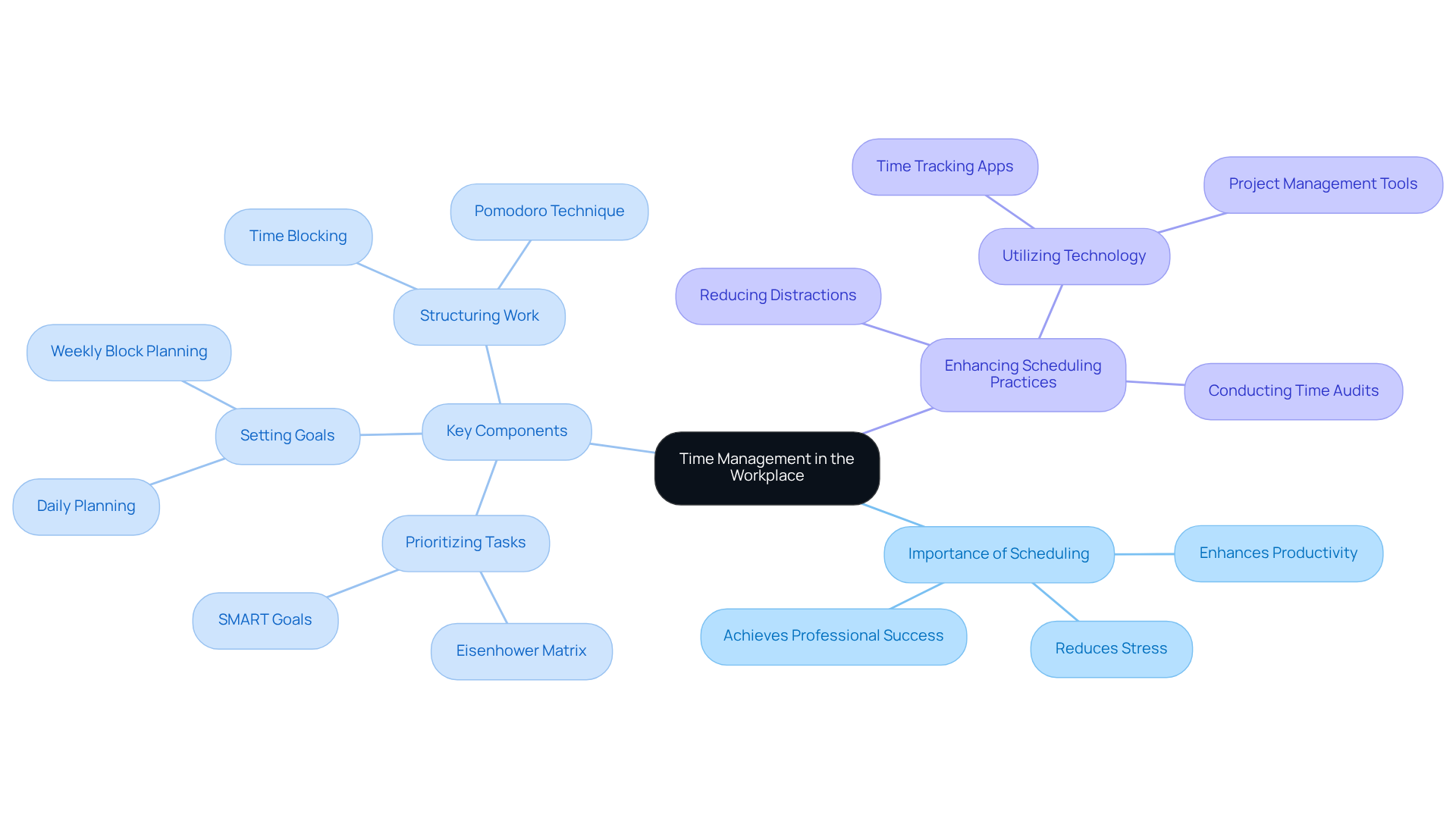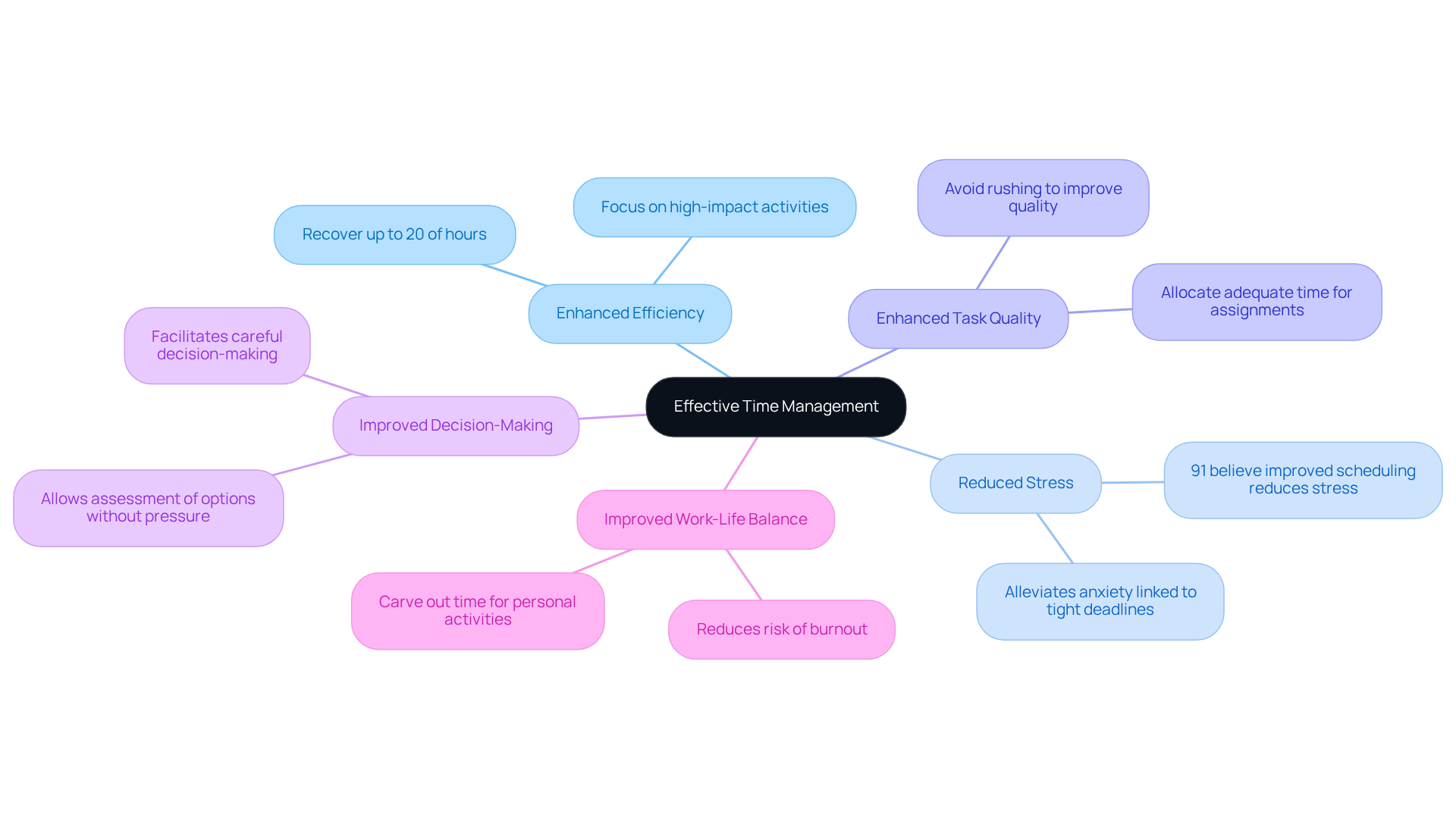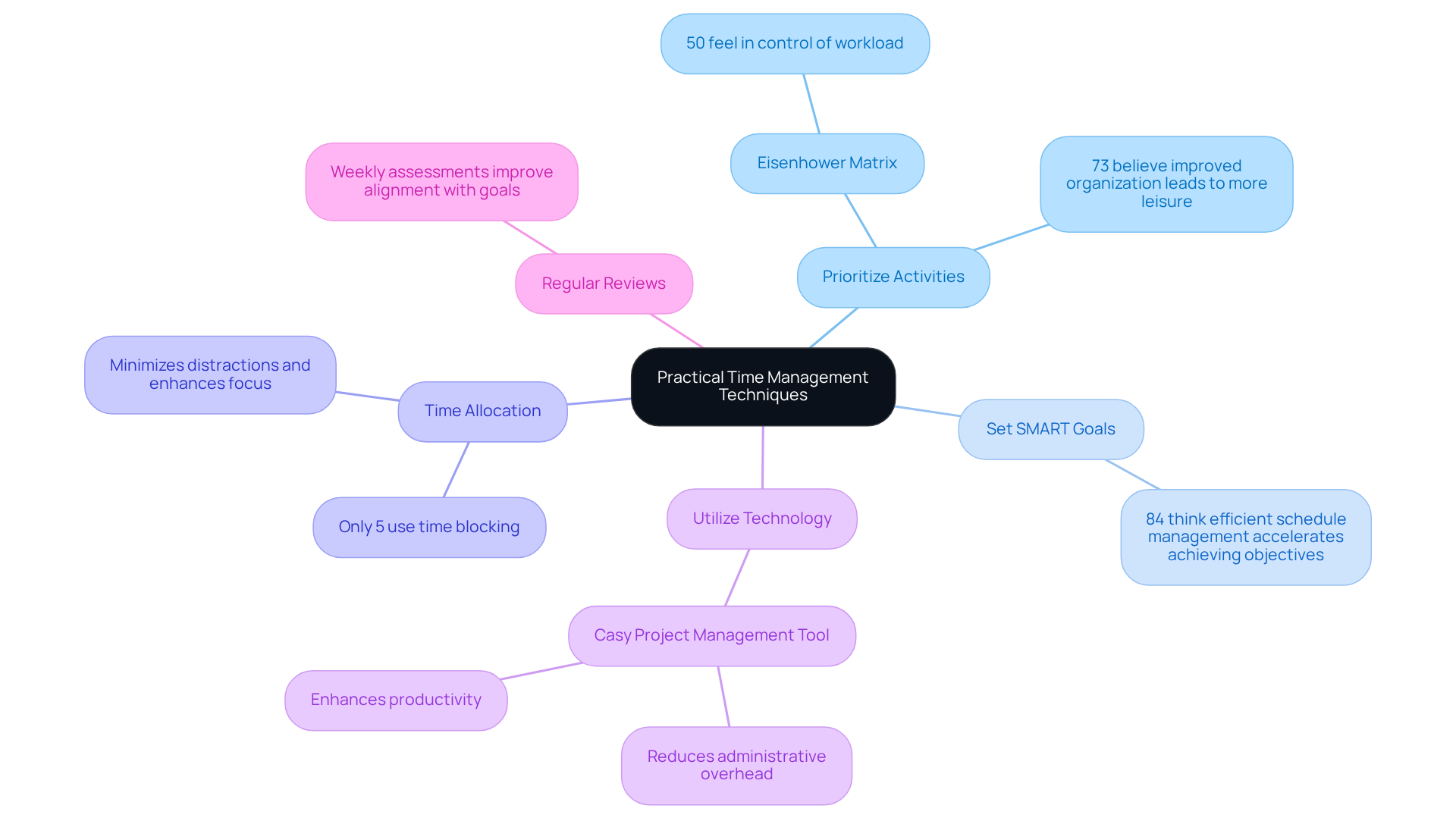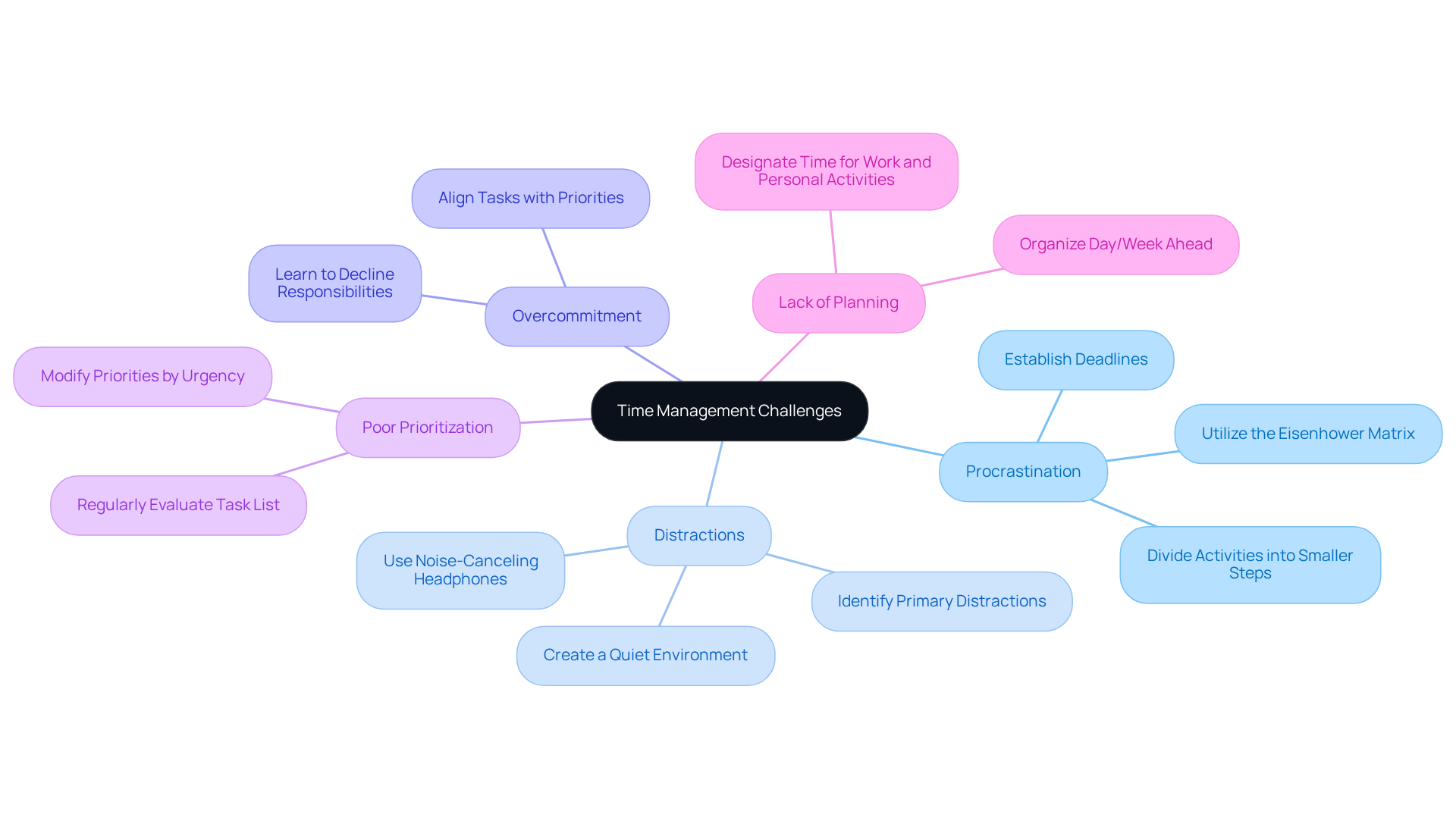Overview
The significance of time management in the workplace is paramount; it enhances efficiency, alleviates stress, and boosts overall productivity. Effective scheduling techniques, such as prioritizing tasks and setting SMART goals, empower employees to accomplish more in less time while preserving a healthy work-life balance.
Consider how these strategies could transform your daily operations. By implementing these methods, you not only improve your output but also cultivate a more satisfying work environment. Embrace the power of time management and witness the positive changes it can bring.
Introduction
Effective time management stands as a cornerstone of success in today's fast-paced work environments, where the pressure to meet deadlines and achieve goals can often feel overwhelming. Mastering the art of scheduling not only enhances productivity but also significantly reduces stress, empowering employees to thrive both professionally and personally. Yet, many individuals encounter common challenges, such as procrastination and distractions. This raises a critical question: how can professionals refine their time management skills to unlock their full potential?
Define Time Management and Its Workplace Relevance
Scheduling is the process of organizing and regulating the duration allocated to specific activities. Effective scheduling empowers individuals to achieve more in less time, alleviates stress, and fosters professional success. In the workplace, the importance of time management is crucial for efficient scheduling, meeting deadlines, reaching objectives, and sustaining a healthy work-life balance. It involves:
- Prioritizing tasks
- Setting goals
- Structuring work to boost productivity while minimizing wasted effort
By mastering scheduling techniques, employees can make informed decisions about their time management, underscoring the importance of time management in the workplace, especially in fast-paced environments such as startups and project management.
How can you enhance your scheduling practices to maximize your efficiency?

Explore the Benefits of Effective Time Management
The importance of time management in the workplace presents a multitude of significant benefits that can profoundly transform workplace dynamics, particularly in startups.
- Enhanced Efficiency: Focusing on responsibilities and prioritizing high-impact activities enables employees to achieve more within a shorter timeframe. Studies suggest that implementing effective scheduling techniques can recover up to 20% of hours, allowing teams to concentrate on essential tasks and elevate overall productivity.
- Reduced Stress: Thoughtful planning and organization can significantly alleviate the anxiety linked to tight deadlines and demanding workloads. Research shows that 91% of individuals believe improved scheduling reduces workplace stress. Conversely, ineffective scheduling can lead to increased team conflicts, while efficient organization fosters better communication and diminishes stress among team members, promoting a healthier work environment.
- Enhanced Task Quality: Allocating adequate time for each assignment empowers employees to produce higher-quality results. With effective scheduling, individuals can avoid the pitfalls of rushing, which often compromises work quality and decision-making.
- Improved Decision-Making: Organizing schedules effectively facilitates careful decision-making, as individuals gain the opportunity to assess options and consider outcomes without the pressure of looming deadlines. This efficiency enhances decision-making skills, enabling individuals to weigh all alternatives, leading to more informed choices and greater self-confidence in professional settings.
- Improved Work-Life Balance: Efficient schedule organization allows employees to carve out time for personal activities, reducing the risk of burnout and boosting job satisfaction. Striking a balance between professional and personal life is crucial for overall well-being; this equilibrium is essential for maintaining healthy relationships, as poor organization can often lead to neglecting personal life in favor of work obligations.
Integrating effective scheduling techniques emphasizes the importance of time management in the workplace, as it enhances productivity and contributes to a more harmonious and efficient workplace atmosphere. Furthermore, employing tools such as the Eisenhower Matrix can aid in prioritizing tasks effectively, thereby improving organizational practices.

Implement Practical Time Management Techniques
To implement effective time management, consider the following techniques:
- Prioritize Activities: Utilize the Eisenhower Matrix to differentiate between urgent and important activities, ensuring a focus on what truly matters. This method has shown that 50% of users feel more in control of their workload, significantly enhancing task prioritization. Furthermore, 73% of people believe that improved organization results in more leisure, emphasizing the significance of prioritization.
- Set SMART Goals: Establish goals that are Specific, Measurable, Achievable, Relevant, and Time-bound. This organized method offers clear guidance and encouragement, demonstrating the importance of time management in the workplace, resulting in enhanced productivity and goal attainment, as 84% of individuals think efficient schedule management accelerates achieving objectives.
- Time Allocation: Assign particular intervals for various activities or duties. This technique minimizes distractions and enhances focus, demonstrating the importance of time management in the workplace by allowing for deeper engagement with high-value tasks. Studies suggest that scheduling blocks can minimize context switching, a significant productivity hindrance. Notably, only 5% of individuals presently utilize time blocking for organizing their time, underscoring the importance of time management in the workplace and highlighting a substantial opportunity for enhancement.
- Utilize Technology: Employ tools such as Casy to automate project organization and reminders. By gathering essential information from discussions and generating assignments automatically, Casy enables teams to focus on primary activities without the burden of administrative duties, tackling common challenges in project coordination. Casy's effectiveness is supported by case studies showing that it significantly reduces administrative overhead and enhances productivity.
- Regular Reviews: Conduct weekly assessments of your tasks and goals to evaluate progress and make necessary adjustments. Frequent evaluations can assist in recognizing areas for improvement and ensure alignment with overall goals, thereby emphasizing the importance of time management in the workplace and promoting a culture of ongoing improvement in scheduling practices.

Identify and Overcome Common Time Management Challenges
Common time management challenges include:
- Procrastination: Combat this by dividing activities into smaller, manageable steps and establishing deadlines for each. Studies show that the average adult procrastinates for 218 minutes daily, which can significantly impact productivity and cost businesses. For instance, for a team of 10 earning $50/hour, daily procrastination of just 2 hours can lead to an annual loss of $500,000.
- Distractions: Identify your primary distractions and create an environment that minimizes them, such as using noise-canceling headphones or designating quiet hours. Notably, 80% of workers report being distracted by office chatting, which can hinder focus.
- Overcommitment: Learn to decline responsibilities that do not align with your priorities or objectives, ensuring you have sufficient opportunity for essential activities.
- Poor Prioritization: Regularly evaluate your task list and modify priorities according to urgency and significance. Utilize tools such as the Eisenhower Matrix, recognized as the most effective technique for organizing tasks, with users feeling in command of their responsibilities most of the week.
- Lack of Planning: Cultivate a routine of organizing your day or week ahead, designating moments for both work and personal activities to guarantee a balanced approach. Ineffective organization of schedules can lead to heightened anxiety and depression, rendering efficient planning even more essential.
By addressing these challenges with practical strategies, individuals can significantly improve their time management skills, which underscores the importance of time management in the workplace, leading to enhanced productivity and reduced stress.

Conclusion
Mastering time management is essential for fostering a productive and harmonious workplace. By effectively scheduling and prioritizing tasks, employees can enhance their efficiency, reduce stress, and improve the quality of their work. The relevance of time management in professional settings cannot be overstated, as it directly impacts not only individual performance but also the overall atmosphere of the organization.
Key insights from the article highlight the numerous benefits of effective time management, including:
- Enhanced efficiency
- Improved decision-making
- A healthier work-life balance
Techniques such as the Eisenhower Matrix, SMART goals, and regular reviews play a crucial role in overcoming common challenges like procrastination and distractions. Adopting these strategies can lead to significant improvements in productivity and employee well-being.
Ultimately, embracing effective time management is not just about completing tasks; it is about creating a sustainable work environment that promotes growth and satisfaction. By prioritizing time management skills, professionals can unlock their full potential and contribute positively to their organizations. It is imperative to take action now and implement these techniques, ensuring that time is not just managed, but optimized for success in the workplace.
Frequently Asked Questions
What is time management?
Time management is the process of organizing and regulating the duration allocated to specific activities to achieve more in less time, alleviate stress, and foster professional success.
Why is time management important in the workplace?
Time management is crucial in the workplace for efficient scheduling, meeting deadlines, reaching objectives, and maintaining a healthy work-life balance.
What are the key components of effective time management?
The key components of effective time management include prioritizing tasks, setting goals, and structuring work to boost productivity while minimizing wasted effort.
How can mastering scheduling techniques benefit employees?
Mastering scheduling techniques allows employees to make informed decisions about their time management, which is especially important in fast-paced environments like startups and project management.
What are some practices to enhance scheduling efficiency?
The article suggests enhancing scheduling practices but does not provide specific methods. However, it emphasizes the importance of effective scheduling for maximizing efficiency.




